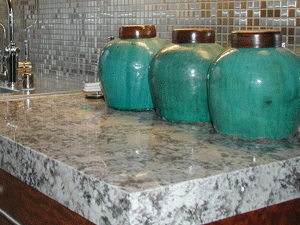The Secrets to Making Your Way in the Marble Market
- Written by Admin TOA
- Published in Industries
By Hasan Kürşad Devecioğlu
Turkish firms are very visible in the US marble and natural stone markets. Home to almost half of the world's natural stone reserves, Turkey is an active player in the US market. In addition to the Turkish firms already established in the US, every year new Turkish firms attempt to find success in the market.

What sort of preparation should marble firms from Turkey wishing to enter the US market take?
Besides the US's large geography, it is also a country of vastly different consumer tastes. Market research should precede any decision regarding which region or state in America to enter. Many Turkish firms are disappointed when they come to the US expecting huge returns on their investments and come up empty-handed because they didn't conduct the proper market research. Market research, however, can be a two-edged sword. If you don't collect information or analyze data properly, you can be led in the wrong direction.
What's the least risky method for entering the US market?
It's very probable that the most effective and least risky way of entering this market is to supply marble to well-established wholesalers and importers. In the past couple of years, many Turkish marble firms, whether directly or by forming partnerships, have opened warehouses in various American states. Just as this situation has increased competition, so have prices fallen for Turkish products. However, opening a warehouse, dealing with operational issues, and taking high risks can all be avoided simply by dealing with domestic wholesalers and importers.
What are the difficulties in the market and what needs to be done to overcome them?
Some of the main difficulties in the market include competition, the ability to collect revenue, imitation, and prejudice. Competition is quite fierce in the American market. Wherever there is competition, there is naturally a drop in product prices also. It is clear that a price war-style competition would not ensure success for either side. Differentiation is what needs to be done in this situation. This could be through product differentiation, unique packaging, increasing the quality of customer service, or establishing yourself as different in comparison to your competitors. Unfortunately, we often see Turkish marble production firms established in the US competing on the basis of prices. This unnecessary competition harms not only the companies but also the Turkish marble sector as a whole.
What sort of challenges are faced in collection of revenues?
In the US it's possible to research the credit histories of both persons and firms. Turkish companies must take advantage of this opportunity. In addition to getting a credit history, researching the other companies your customer firm works with and discussing the customer firm with them can be very helpful.
What sort of difficulties are you talking about with “imitation” and “prejudice”?
If rival firms all of a sudden start importing products that you intended to be unique to the market, than your product will quickly become just one of many. There are two ways to prevent this. First, make a deal with the factory that produces your product. Ask that they give you sole sales rights to a particular region or state. Second, try your hardest to get your new marble products onto the target market quickly.
Prejudice is another difficulty in this market. Today Turkish marble is known in the American market. However, not everyone in this market has a positive view of Turkish marble. It's only natural that American marble importers or wholesalers who have dealt with Turkish marble companies would be hesitant to try again, since many of these producers did not match their talk with the promised quality of marble. The mistake that one Turkish marble producer makes simply contributes to the generalizations leveled at others in the Turkish marble sector. But it is an issue that may come up.
What are some issues that American firms buying marble consider?
They generally pay attention to which firms you are working with, the quality of the products, product consistency, and customer service. It's also important for a long-term trade partner that your products are high-quality and that they are consistently high-quality. Most American companies also place a lot of importance on good customer service.
It's also really important that the quality of the delivered product match what the producer promises. Another indication of production quality comes by checking up on the marble while it is being produced. If you have a team of quality experts assessing the quality of the marble being produced, that could be a real bonus for marble buying firms in the US.
Can you talk a bit about the methods used by firms that have found success in the market?
Marble firms that have found success in the market are distinguished by two elements: their knowledge of what their customers want and the ability to deliver high-quality marble. This is also true of well-established marble importers in the US who work with large retailers such as Home Dept and Lowe's. The marble and natural stones used in the US are mostly imported from other countries. Because of this, the marble producers of these countries must be on good terms with the importers in order to attain the quality desired. On the other hand, if you don't import goods that meet the expectations or demands of the customers, then you can't properly sell your products. Basically, the marketing and customer service aspect of the operation must support the product buying and importing side, and vice-versa. This is what successful marble firms have done and continue to do.
What can Turkish firms offer to set themselves apart from Italian companies?
Turkey is undoubtedly the leader in travertine importing in the US. In terms of marble, Italy is Turkey's biggest competitor although Turkey's raw material sources are richer than Italy's. When it comes to workmanship and machinery, Turkey is not lagging behind anyone. In fact, there are Italian firms that buy marble from Turkey, stamp “Made in Italy” on it, and sell it for high prices to the US. The most obvious example of this is the marble that we know as “Elazığ Vişne” (Elazığ Sour Cherry). Italian firms marketed this marble as “Rosa Levanto El Turko” to the US for years before Turks were even competitive in the US market. The US naturally sees this stone as an Italian product. 
Then creating a brand is unavoidable?
Italian marble products are built upon the notion of “luxury,” meaning for American consumers and importers that Italian marble is synonymous with an idea of luxury. This is the place of Italian marble products in the minds of Americans. Changing this is almost impossible. For this reason, Turkish marble must market itself differently in the American market. Today Turkey is seen as an exotic and mysterious country to Americans. If we position ourselves as “Mysterious, Exotic Turkish Marble” through marketing and advertising, we can not only introduce Turkish marble to the market but can also distinguish ourselves from Italian rivals through our own unique brand positioning. Of course, Turkish marble firms in the US and in Turkey must take these steps together.
How important is technology in selling products?
It's difficult to sell marble products without showing samples. However, the Internet provides great opportunities for marketing and publicizing activities. A website, complete with a catalog of your products and digital photographs, will actually save you a lot of money and energy and will allow you to reach more potential customers. Moreover, it is possible to conduct customer surveys over the Internet and then analyze the results in order to improve your business.
THE TEN MOST IMPORTANT FACTORS IN THE MARBLE MARKET
* Do some market research regarding the region or state in which you want to work.
* In order to minimize risk, supply marble to well-established wholesalers and importers.
* Don't enter price wars in the name of competition.
* Don't try to open a warehouse without knowing the market.
* Differentiate yourself when introducing your product to the market.
* Import products according to customers' demand and expectations.
* Make a special deal with your factory in order to protect against imitation products.
* Definitely use technology. You should establish a website that showcases your products.
* The marketing and customer arm of the operation and the supply purchasing and importing arm should support one another.
* Research the credit history of the firms you are selling products to in order to avoid any problems with collection of revenues.
FOR MORE INFORMATION
For more information on entering the US marble market, access Hasan Kürşad Devecioğlu’s book, entitled “Strategic Natural Stone Marketing,” on the website www.marketingmarble.com. ISBN 10: 0-9765600-3-8 / ISBN 13: 978-0-9765600-3-6
(December 2007, 27th Issue)
Latest from Admin TOA
- Dünya Enerji Konseyi Avrupa Bölgesel Toplantısı İstanbul’da Gerçekleşti
- Retrial Ordered in Fraud Case Against Turkish-American Businessman Yalçın Ayaslı
- From a Bag Stand in Connecticut to a 40,000 Square Foot Warehouse in New Jersey: Ali Dayı's Entrepreneurial Journey
- Hiram & Solomon Cigars Introduces the Patriot Cigar Honoring M.W. George F. Hamilton, 91st Grand Master of Masons in Massachusetts
- PCA Officially Announces 2025 Trade Show Dates
